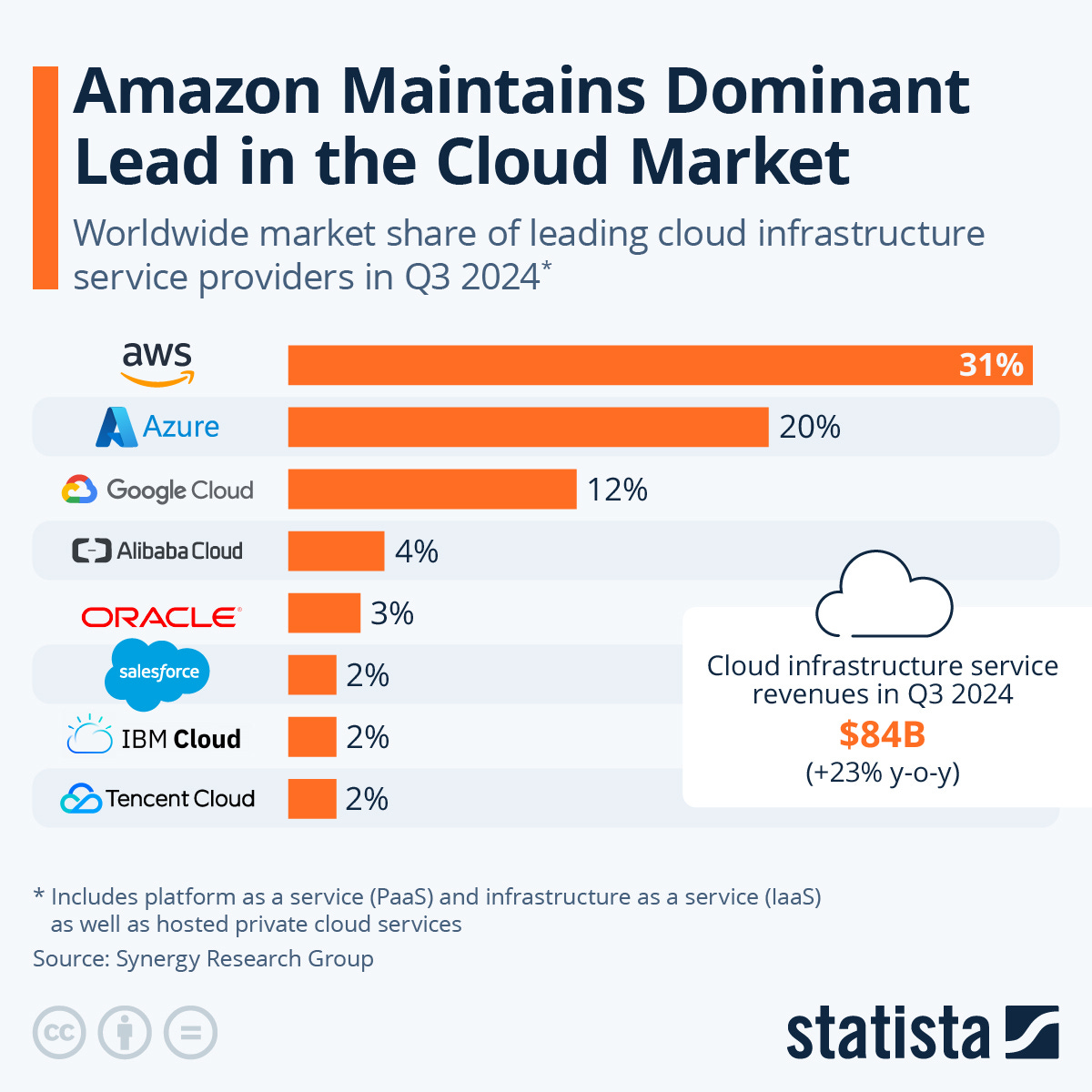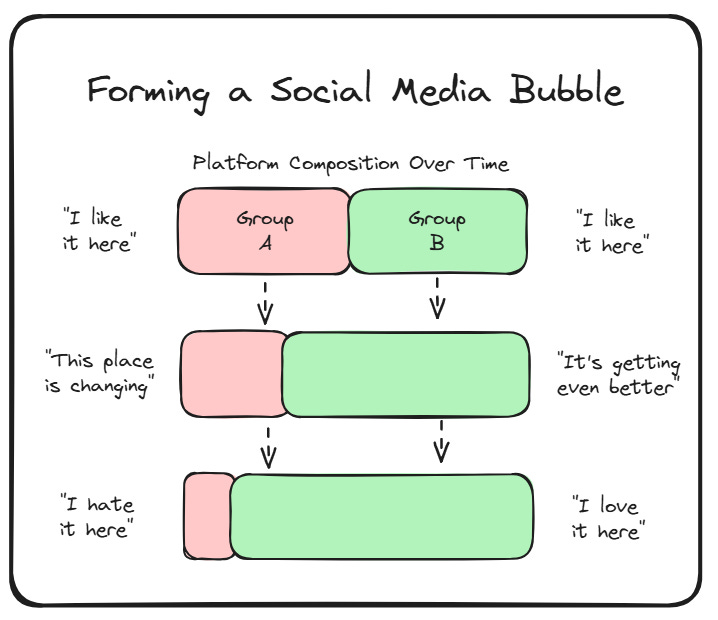Welcome back to Forests Over Trees, your weekly tech strategy newsletter. It’s time to zoom-out, connect dots, and (try to) predict the future.
Here’s the plan:
Tech News Takes — super-short analysis and commentary
Strategy Tips — strategy nuggets (for business and life)
F/T Shoutouts — sharing launches, tech events, and other reads

Bluesky won’t bring back Twitter
Plus: Microsoft’s custom chips, Oura ring’s glucose data
⚡ Tech News Takes ⚡
Microsoft Creates Custom Chips
What’s up: Microsoft released their first custom data processing unit (DPU) These DPUs take data-intensive work that used to be performed by GPUs (all the rage with AI use cases) and CPUs (traditional computing chips). Microsoft claims the DPU will help their Azure servers achieve 4x higher performance and 60% less power.
So what: Just as in other areas of tech and life, when the goal is to be the best at something, specialization beats generalization. We should expect the specialization trend to continue, with dozens of other chip types being invented in the long term. Also, the hyperscalers have all indicated in recent earnings calls that they cannot afford to underspend during this inflection point in AI – and will continue to spend like drunken sailors. So this DPU-driven efficiency improvement is a huge win.
Another Attack of the Twitter clones
What’s up: Bluesky rushed from 15M to 20M users in the last week, and Threads hit 275M monthly active users in early November. Both sites are adding ~1M per day. For reference, X reported ~250M daily active users in September. The consensus is that recent moves by Elon at X – including a new privacy policy that allows X to train AI models on users’ past tweets – have caused a mass migration from X to both Bluesky and Threads.
So what: First, let’s acknowledge that the data isn’t apples to apples (all users vs. monthly actives vs. daily actives), so X is probably at least 5x bigger than Threads. That said, I do think the migration away from X is real. But whereas before I thought one of the newcomers would become the new Twitter and completely dominate, I’m increasingly convinced the migration is actually just a dispersion. Being online makes it easier to find and grow homogenous, dispersed communities, and that’s what I expect will happen here. Already, they each seem to have their own vibe – Threads avoiding news and leaning left, Bluesky embracing news and aiming for neutral, X leaning right.
FTC Final Push
What’s up: The FTC is reportedly starting to investigate whether Microsoft acted anti-competitively to dominate the cloud market. Customers have alleged Microsoft made transferring cloud data out of Azure difficult and expensive.
So what: Two threads to pull on here. First, this is a bold move with only two months left before President Trump gets inaugurated (again). There’s been speculation that Trump will quickly replace current FTC Chair Lina Khan. Maybe Khan is trying to gather so much data that the future Chair feels like it’s too compelling to ignore. Second, it’s an interesting choice to go after Microsoft, a semi-distant #2 in an increasingly competitive cloud market (AWS at 31% market share, Azure 20%, Google Cloud 12% -- per Statista).
Dexcom + Oura Deal
What’s up: Oura (a fitness tracking ring-maker) raised $75M from Dexcom (a glucose monitoring device-maker) at a $5B valuation as part of a newly announced partnership. They also plan to sell each others’ products and share data, so Oura users can centrally track activities, food, and blood sugar. Dexcom has a similar data partnership with Apple.
So what: The FDA has been strict about the regulatory approvals it hands out for glucose monitoring companies like Dexcom, so this is the best/quickest way that “move fast and break things” tech companies can get access to glucose data for consumers. But at the same time, the incoming Trump administration is expected to significantly roll back regulations. Theoretically, that should mean easier paths to building your own device, so Oura is probably kicking themselves about the timing of this deal getting done.
🧭 Strategy Tips 🧭
Bluesky won’t bring back Twitter
Today’s strategy tip is all about network effects.
Specifically, I want to talk more about the Bluesky story from earlier, using the network effects framework to make sense of it.
Here’s the framework in a nutshell – a network effect is when the value of a good or service changes in proportion to the number of people using it. Facebook is a classic example – when you went from having 10 to 100 to 500 friends on Facebook, each jump led to a jump in your enjoyment. More wall posts, more photos to look at, and more engagement. That’s a positive network effect.
Easy, right?
But there can also be negative network effects!
Imagine you’re the only Uber driver in a town full of riders. How sweet is that?
Then suddenly, there are 10 more drivers. For riders, this is good (lower wait times, less surge pricing). But for you, this is bad (more idle time, less surge pricing).
When there are multiple groups of users on a single platform, and those groups have conflicting needs, then an increase in users can be a negative network effect for Group A and a positive network effect for Group B.
So here’s where the Bluesky story comes back in.
Remember how we said very distinct cultures are being created for Bluesky vs X vs Threads?
As those cultures form, they push out people who don’t fit-in (negative effect), and they attract more people who do fit-in (positive effect). And the end result is something that should feel pretty familiar – [social] media bubbles!
For my visual learners… ze visual!
Things are still in flux, but it seems like that dynamic of reinforcing and growing bubbles might be stronger than the simple network effects we typically hear about, where it’s winner-take-all.
So based on all that, I don’t think Bluesky will be the next Twitter.
🌲 F/T Shoutouts 🌲
Letting ideas speak for themselves – I enjoyed this LinkedIn post about separating job titles from ideas, in hopes that good ideas will beat out corporate politics and hierarchy. It made me think about situations where we do the opposite (ex. congresspeople attaching their names to bills)
My brother was right (this one time) – He’s a huge fan of Apple News, and I typically give him a hard time because I don’t know anyone else reading it! But apparently legendary tech analyst John Gruber says Apple News is good now and we should all give it a second shot.
Prediction markets can go beyond elections – Vitalik, the co-founder of Ethereum, is such a clear, thoughtful writer. Loved this write-up from him about how prediction markets can become a tool for making decisions big and small. If the Polymarket election betting stories blew your mind, and you want to nerd out on what might be next, check this out.
The forest is growing.
Feel free to share this post.



